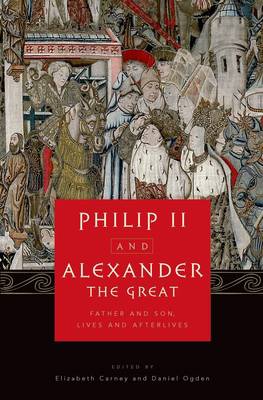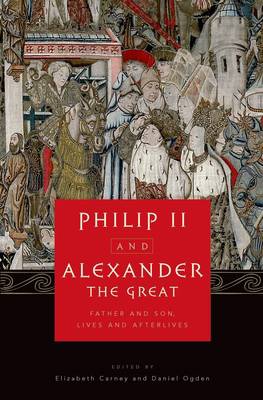
- Retrait gratuit dans votre magasin Club
- 7.000.000 titres dans notre catalogue
- Payer en toute sécurité
- Toujours un magasin près de chez vous
- Retrait gratuit dans votre magasin Club
- 7.000.0000 titres dans notre catalogue
- Payer en toute sécurité
- Toujours un magasin près de chez vous
Philip II and Alexander the Great
Father and Son, Lives and Afterlives
Elizabeth Carney, Daniel Ogden
Livre relié | Anglais
281,95 €
+ 563 points
Description
The careers of Philip II and his son Alexander the Great (III) were interlocked in innumerable ways: Philip II centralized ancient Macedonia, created an army of unprecedented skill and flexibility, came to dominate the Greek peninsula, and planned the invasion of the Persian Empire with a combined Graeco-Macedonian force, but it was Alexander who actually led the invading forces, defeated the great Persian Empire, took his army to the borders of modern India, and created a monarchy and empire that, despite its fragmentation, shaped the political, cultural, and religious world of the Hellenistic era. Alexander drove the engine his father had built, but had he not done so, Philip's achievements might have proved as ephemeral as had those of so many earlier Macedonian rulers. On the other hand, some scholars believe that Alexander played a role, direct or indirect, in the murder of his father, so that he could lead the expedition to Asia that his father had organized. In short, it is difficult to understand or assess one without considering the other. This collection of previously unpublished articles looks at the careers and impact of father and son together. Some of the articles consider only one of the Macedonian rulers although most deal with both, and with the relationship, actual or imagined, between the two. The volume will contain articles on military and political history but also articles that look at the self-generated public images of Philip and Alexander, the counter images created by their enemies, and a number that look at how later periods understood them, concluding with the Hollywood depiction of the relationship. Despite the plethora of collected works that deal with Philip and Alexander, this volume promises to make a genuine contribution to the field by focusing specifically on their relationship to one another.
Spécifications
Parties prenantes
- Auteur(s) :
- Editeur:
Contenu
- Nombre de pages :
- 368
- Langue:
- Anglais
Caractéristiques
- EAN:
- 9780199738151
- Date de parution :
- 24-06-10
- Format:
- Livre relié
- Format numérique:
- Genaaid
- Dimensions :
- 163 mm x 236 mm
- Poids :
- 657 g

Les avis
Nous publions uniquement les avis qui respectent les conditions requises. Consultez nos conditions pour les avis.






